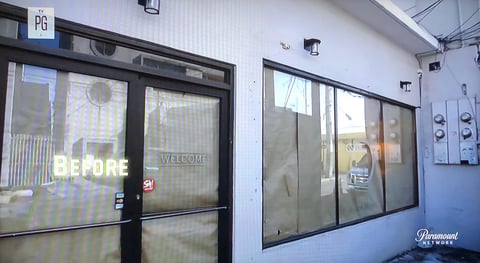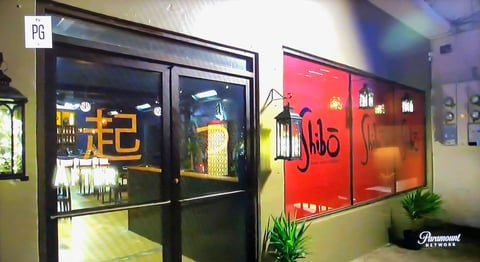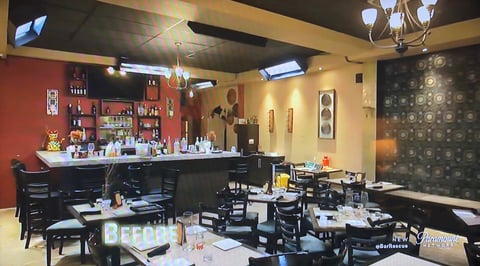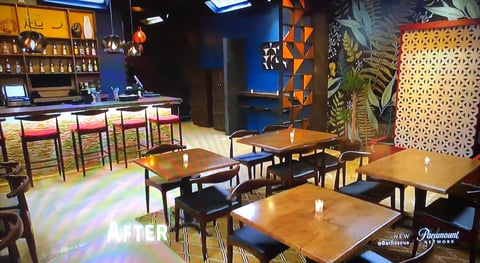For over 30 years, Jon Taffer has traveled the country saving hundreds of bars from failure and ruin. During last night’s episode of Paramount Network’s hit show Bar Rescue, he headed to San Juan, Puerto Rico, with chef-owner Anthony Lamas of Seviche in Louisville, Kentucky, and mixologist Rob Floyd. The team was on a mission to save Shibō, a restaurant devastated by Hurricane Maria.
Shibō, a showcase for the creativity of chef Jonathan Cruz, was opened in 2016. Chef Cruz’s sister Gabriella and her husband invested in the Puerto Rican-Asian fusion restaurant to support the chef and provide for their futures. Cruz had made a name for himself even before Shibō first opened its doors. The restaurant enjoyed a steady flow of local and tourist guests. Chef Cruz, his girlfriend and Shibō manager Maria, Gabriella and her husband were living their dreams.
And then Hurricane Maria, a Category 5 hurricane, tore Puerto Rico apart in September of 2017.
The tropical storm happened to strike around the time Shibō was to celebrate its first-year anniversary. An estimated 2,975 fatalities in Puerto Rico, both direct and indirect, have been attributed to Hurricane Maria based on a study commissioned by the governor of the commonwealth. The topical cyclone is estimated to have caused $91.61 billion in damage.
Taffer, chairman of Nightclub & Bar Show, moved to Puerto Rico at the age of 7, returning to the mainland at the age of nine. He feels a connection to the unincorporated territory of the United States and sought to not just return Shibō to its former glory but elevate it to where Chef Cruz, Gabriella and Maria would have taken it had Hurricane Maria not ripped apart Puerto Rico and if they had the money to do it themselves. At the time Taffer and his experts took on the challenge Shibō presented, the restaurant had been closed for 7 months.
Read this: Jon Taffer Named Chairman for Nightclub & Bar Convention and Trade Show
With Shibō closed and Taffer and his team unaware of its exact state, another restaurant was secured to be used as a training location: 2017 Nightclub & Bar Restaurant Bar of the Year award winner La Coctelera. With a limited menu of just three dishes and three cocktails available, Taffer felt the best course of action was for him, Lamas and Floyd to each order one of everything. This would test speed of service and consistency while giving the experts a taste of Shibō’s food and beverage.
The first dish, Futumaki, combined sushi with mango, avocado and wasabi, an excellent representation of Chef Cruz’s Puerto Rican-Asian cuisine. The dish was a success. So much so that Taffer declared, “I’d come out of my way for this.” The next food item, Fufu Dumplings, elicited a “Wow” from Taffer. Miso Mofongo Chicken, a take on the traditional Puerto Rican mofongo chicken dish that features miso sauce, furikake and bok choy, was also a success. Each course came with a cocktail, each of which was well balanced. “There’s passion here,” said Taffer, praising Gabriella for knowing everything about the food she delivered. The problem was clearly not the food or beverage.
One problem was noticed by Lamas, who explained that he spends time in his dining room every night to get to know people, develop relationships, and transform guests into regulars. That revelation prompted Taffer to question why Chef Cruz hadn’t come out of the kitchen to greet the table. Seeking an answer, he stepped into the kitchen to see if the chef was too busy to come out and welcome Taffer and his team on their arrival. It turns out no, he wasn’t too busy.
Read this: Bar Marketing and Promotions Ideas Essential to Your Business
Taffer further questioned why, after such a successful night with fantastic food and balanced, beautiful cocktails, Shibō wasn’t open 7 months after Hurricane Maria had struck. Other restaurants had done so and appeared to be doing well. Why couldn’t Cruz, Gabriella and Maria reopen their doors? Surely Gabriella and her husband, Chef Cruz’s backers, were frustrated with the situation.
“You know, I have to rescue people sometimes that don’t deserve it,” said Taffer bluntly. “You deserve it, but it still worries my that you haven’t tried to open it more.”
When asked if they were willing to fight alongside Taffer to reopen Shibō, Chef Cruz, Gabriella and Maria seemed enthusiastic to get started. That enthusiasm dissipated and the excuses arrived when Taffer had the trio bring him to their shuttered restaurant. To the Bar Rescue host, the space didn’t seem damaged beyond repair. In fact, it appeared that all it needed was a deep clean. A lack of a waterline indicated that the restaurant hadn’t flooded. Chairs and tables appeared to require nothing more than a good clean to be brought back to service condition. Less than 10 ceiling tiles needed replacing.
The kitchen also lacked catastrophic damage. Beyond being littered with bugs and spoiled food, the kitchen wasn’t in awful shape. It required cleaning but there had been no flood. Chef Cruz conceded as much while talking with Taffer: there had been a little water in the kitchen but it hadn’t really flooded. If it were cleaned overnight, Chef Cruz and his kitchen team could cook in it safely the next day. As far as Taffer could tell, the operators had given up before even making a real attempt at fighting to save and reopen Shibō. They hadn’t even thrown out the spoiled food over the course of 7 months.
Had the trio and their staff cleaned the restaurant even the day before Taffer arrived in San Juan, they could have cooked for him, Lamas and Floyd at Shibō rather than La Coctelera. Disappointed in the state of the restaurant and the excuses from Chef Cruz, Gabriella and Maria, Taffer gave them a cleaning crew and an ultimatum: Show him they intend to fight to reopen their restaurant by cleaning it overnight.
Read this: Be More than Good Enough: Transform Your Bar into a Destination
The next day, with less than 70 man-hours of effort and under $200 in cleaning chemicals, Shibō had been brought back to life. That task completed, Taffer returned to get a picture of the operation’s financial state. Gabriella and her husband had made an initial investment $30K. However, Gabriella revealed that her husband had taken a loan out in his name when the bank wouldn’t give one to the restaurant. She said they owed $50-60K on that loan and another $12K to suppliers and the landlord. Taffer estimated that around $150K is owed and was concerned that they would default on the personal loan any day, putting Gabriella’s family at risk.

The financial plan, initially, was to get the kitchen firing, the bar pouring, and the doors opening so that enough revenue could be generated to give the bank, landlord and suppliers enough money to leave the trio alone while they revived Shibō.
“This wasn’t a failure like I normally deal with on Bar Recue,” says Taffer. Rather, a ruthless storm had forced the closing of the restaurant.
Essentially, when Hurricane Maria struck, the futures of Chef Cruz, Gabriella, Maria and others had been stopped in their tracks. Taffer hoped to somehow turn the hurricane’s devastation into a blessing rather than a curse and re-energize the operators and their staff. He also had no interest in making sweeping changes to Chef Cruz’s concept. Instead, he wanted to elevate Shibō and transform it into the showcase the chef deserved. The rescue strategy involved having the Shibō team collaborate with Lamas and Floyd to revive the menu for the grand reopening.

Lamas wanted Chef Cruz to spend more time in his dining room, getting to know his guests. That meant Chef Cruz learning to trust his team more. Floyd noticed that the drinks were all sake influenced and wanted to see more options on the menu: different colors, different flavors, different spirits, even different sizes. He introduced the team to a drink developed for Shibō called the Piña En Fuego, which features muddled piña and jalapeños and tequila. As he built the cocktail he reminded the team to smile, make sure to look around the bar, and greet new guests.
Read this: How Training Reduces Costs and Grows Revenue
Before the stress test, Taffer explained that the average guest in Puerto Rico consumes two cocktails per hour. He also shared that if a woman and man come into a restaurant to dine together and the woman orders a cocktail first, the man will almost always order one as well as opposed to ordering something from a different beverage category.
During the stress test, cocktails came out slow and were unbalanced. Bartender Braian struggled to get drinks to tables or even guests seated at the bar. In fact, food beat drinks to tables. One guest revealed to Taffer that his drink hadn’t arrived after 18 minutes (and counting). Taffer estimated at one point that the bar was 25 drinks behind. Guests were getting food but not drinks.
When Chef Cruz checked on the dining room, guests let him know they were frustrated with the experience and level of service. Unfortunately, drink service only became slower and Taffer decided that Shibō needed to be shut down. As he explained, restaurants don’t sell food and drinks, they sell reactions. Those reactions are created through the guest experience which is only positive if everything about an operation is on point.

It wasn’t all bad news, though. Taffer pointed out a huge positive from the stress test: Chef Cruz had delivered the news that the restaurant would be shut down but also invited the guests to return for a better experience. The response to that invitation had been positive. Giving his guests face time had facilitated the forming of bonds, leading to guests forgiving the stumbles and eager to give the operators a second chance.
Read this: Increase Guest Counts: Get out of the Fishbowl and into the Ocean
The next day, Floyd worked with Braian and new bar hire, Edwin, who had 10 years of experience as a bartender. Taffer revealed that mostly stable power had returned to the area in which Shibō is located two months prior to his arrival. That meant that had the trio cleaned and reopened just 8 weeks back, they could have captured every other restaurant’s customers.
As part of the renovation, Taffer installed two work stations behind the bar so bartenders would no longer be stepping on one another as they made drinks from a center station. He also installed a Harbortouch POS system, provided lighting features from Lamps Plus reminiscent of Nobu in Las Vegas, gave redesigned uniform shirts to the staff which included a hip, black chef’s jacket for Chef Cruz, and a generator so the restaurant would never lose power. More great news was that Taffer normally touches every table during a grand reopening but didn’t have to in this case—Chef Cruz had beaten him to it! Bartender Braian also improved, keeping up with drink orders during the reopening.

Six weeks after Shibō’s triumphant return, the restaurant is once again open 5 nights per week and business is returning to the level it had been before Hurricane Maria struck.
Jon Taffer, entrepreneur, CEO and hospitality trailblazer, will deliver the keynote “Taffer’s Cut the BS Excuses that Hold you Back” during Questex’s 2019 Nightclub & Bar Show at the Las Vegas Convention Center on Tuesday, March 26 from 11 to 11:45 a.m. Based upon the New York Times bestseller, Don’t BS Yourself!: Crush the Excuses That Are Holding You Back, Taffer’s keynote, sponsored by Paramount Network, will offer methods on how to increase productivity and revenue through challenging the habits and processes business owners use to justify failure. Don’t miss out on this lifechanging keynote!
If you missed this episode when it first aired or would like to watch it again, be sure to visit the Paramount Network website, download the network's app, or search for it on demand via your provider.
